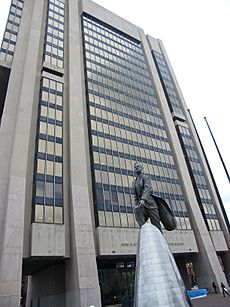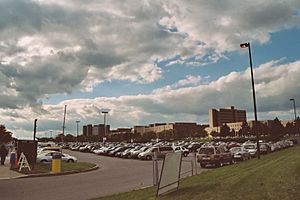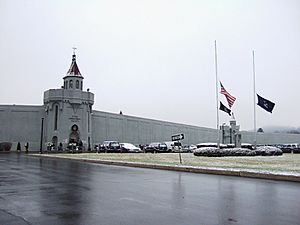Arthur Eve facts for kids
Quick facts for kids
Arthur O. Eve
|
|
|---|---|
| Deputy Speaker of the New York State Assembly | |
| In office 1979–2002 |
|
| Preceded by | William F. Passannante |
| Succeeded by | Clarence Norman Jr. |
| Member of the New York State Assembly from the 141st district |
|
| In office 1983–2002 |
|
| Preceded by | John B. Sheffer |
| Succeeded by | Crystal Peoples-Stokes |
| Member of the New York State Assembly from the 143rd district |
|
| In office 1967–1982 |
|
| Preceded by | Donald Shoemaker |
| Succeeded by | Dennis Gorski |
| Personal details | |
| Born | March 23, 1933 New York, New York, U.S. |
| Political party | Democratic |
| Spouses | Constance Eve (m. 1956) |
| Children | 5 (including Leecia) |
| Residence | Buffalo, New York |
| Alma mater | Erie Community College, (Assoc.) West Virginia University, (B.S.) |
| Military service | |
| Branch/service | United States Army |
| Years of service | 1953–1955 |
| Rank | Corporal |
| Unit | United States Army |
Arthur Owen Eve (born March 23, 1933) is a retired American politician. He was a member of the Democratic Party who served in the New York State Assembly from 1967 to 2002. For most of that time, from 1979 to 2002, he was the Deputy Speaker of the Assembly. This made him one of the most powerful lawmakers in New York State.
Eve represented the city of Buffalo. He was the first Dominican-American elected to a public office in the United States. He was also the first African American to win the Democratic primary election for mayor of Buffalo, though he did not win the final election.
During his long career, Eve became known as a strong voice for liberal causes. He supported economic development, education, and social services. He was a founding member of the New York State Black and Puerto Rican Legislative Caucus. He also played a key role as a negotiator during the 1971 Attica Prison riot.
Contents
Early Life and Education
Arthur Eve was born in New York City. His father was an immigrant from the Dominican Republic. He grew up in Florida during a time of segregation. In 1953, he moved to Buffalo with very little money.
From 1953 to 1955, Eve served in the United States Army and reached the rank of corporal. He was a talented basketball player and even played on a team in Europe while in the army. After his service, he returned to Buffalo.
Eve earned an Associate's degree from Erie Community College and a Bachelor of Science degree from West Virginia University. His first job in Buffalo was at a Chevrolet car plant. He noticed that young people in his community needed more guidance and positive activities. This inspired him to get involved in politics to make a difference.
Family Life
In 1956, Arthur Eve married Constance Bowles. They have five children: Leecia, Arthur Jr., Eric, Martin, and Malcolm.
His children have also been involved in public service. His daughter, Leecia Eve, is an attorney who has run for public office. His son Eric worked in the White House under President Bill Clinton. His son Malcolm also worked for the Clinton and Obama administrations.
After retiring from politics, Eve became an evangelist, a person who shares their religious beliefs with others.
Political Career
Eve was first elected to the New York State Assembly in 1966. He would go on to serve for 36 years, making him one of the longest-serving members.
Fighting for Equal Opportunity
In the 1960s, Eve became a leader in the civil rights movement in Buffalo. He fought against rules that prevented minorities from joining unions and getting good-paying construction jobs.
In 1968, he famously delayed construction of a new campus for the State University of New York at Buffalo. He did this to pressure the state and unions to allow more minority workers into the construction industry. His efforts were successful.
The SEEK/EOP Program
During his first term, Eve helped create the SEEK/Educational Opportunity Program (EOP). He secured the first $500,000 in funding for it. This program helps students from disadvantaged backgrounds attend college in the State University of New York (SUNY) system. Today, it is named the Arthur O. Eve Higher Education Opportunity Program in his honor.
The Attica Prison Riot
In September 1971, a major riot broke out at the Attica Correctional Facility. Inmates took control of parts of the prison and held hostages. They had many complaints about the poor conditions inside.
Because Eve had already been working on prison reform, the inmates trusted him. He was the first elected official to enter the prison to listen to their demands. He became a key member of a team of observers and negotiators who tried to find a peaceful solution.
Eve believed Governor Nelson Rockefeller was wrong to order state troopers to retake the prison by force. The raid ended the riot but resulted in the deaths of many inmates and hostages. Eve was very critical of this decision and felt a peaceful end could have been reached.
1977 Campaign for Mayor of Buffalo
In 1977, Eve ran for mayor of Buffalo. He surprised many people by winning the Democratic primary election. This made him the first African American to do so in the city's history.
However, his victory was met with racist acts, including a cross being burned on his lawn. In the final election, he ran against James D. Griffin, who ran on the Conservative Party line. Griffin won the election, but Eve's campaign was a historic moment for the city.
Deputy Speaker of the Assembly

In 1979, Eve was appointed Deputy Speaker of the New York State Assembly. This made him the highest-ranking African American in the state legislature. He used this position to fight for issues important to his community and to families across the state.
He was a strong voice for:
- Better health care services.
- Funding for education and job training.
- Laws against hate crimes.
- Fairness in the justice system.
Eve often disagreed with governors, including Mario Cuomo and George Pataki, over budget cuts. He believed the state should not balance its budget by cutting services for the poor and working class.
In 2000, Eve helped pass a law to make March 10 "Harriet Tubman Day" in New York. This honors the famous abolitionist who helped many slaves escape to freedom and lived in New York for over 50 years.
Retirement and Legacy
Arthur Eve retired from the Assembly in 2002. After leaving office, he started a foundation to help students in underperforming schools get tutoring. He remained active in public life, continuing to speak out on important issues.
Eve is remembered as a dedicated public servant who fought for equality and justice. His work on education, prison reform, and economic opportunity left a lasting impact on New York State. In 2008, a school in Albany dedicated its conference hall in his honor.
 | Delilah Pierce |
 | Gordon Parks |
 | Augusta Savage |
 | Charles Ethan Porter |



